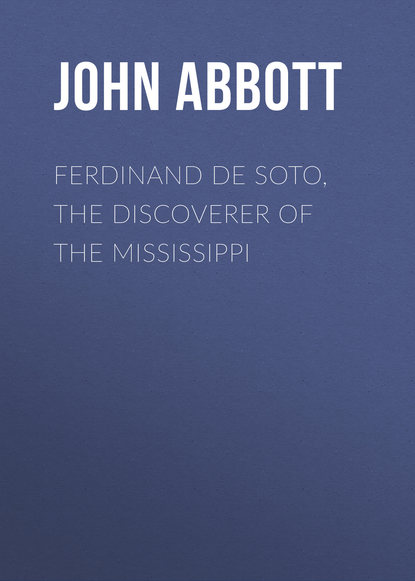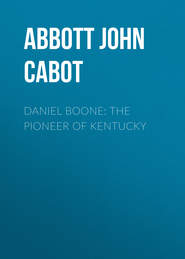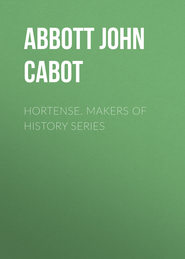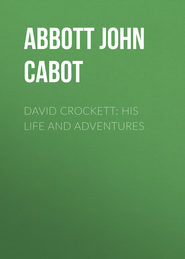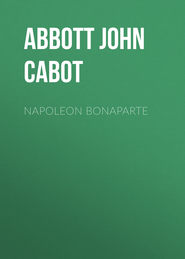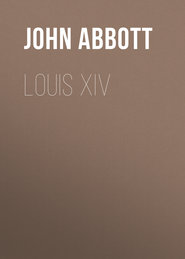По всем вопросам обращайтесь на: info@litportal.ru
(©) 2003-2024.
✖
Ferdinand De Soto, The Discoverer of the Mississippi
Настройки чтения
Размер шрифта
Высота строк
Поля
De Soto turned his keen and flashing eye upon the man, whom he despised, and said in slow and measured words:
"Don Hernando, I may yet convince you that it is neither civil nor safe to call my sincerity in question. I have as much confidence in the honor of the Inca as I have in the integrity of any man in this company, not excepting the commander or yourself. I perceive that you are disposed to go backward. You may all return, when and how you please, or remain where you are. But I have made up my mind to present myself to Attahuallapa. And I shall certainly do so, without asking the assistance or permission of any of your party."
This was certainly a very defiant speech. It asserted his entire rejection of the authority of Pizarro. De Soto could not have dared thus to have spoken, unless he had felt strong in the support of his own dragoons.
Hernando Pizarro was silent, indulging only in a malignant smile. It was not safe for him to provoke De Soto to a personal rencontre. Francisco Pizarro smothered his chagrin and very adroitly availed himself of this statement, to commission De Soto to take twenty-four horsemen, such as he might select, and accompanied by an Indian guide called Filipillo, go forward to the Peruvian court.
Both of the Pizarros seemed quite relieved when the sound of the departing squadron of brave cavaliers died away in the distance. De Soto, during the whole of his adventurous life, seems to have been entirely unconscious of the emotion of fear. During his residence in the camp of the Pizarros, he had exerted a powerful restraint upon their ferocious natures. He had very earnestly endeavored to impress their minds with the conviction that they could not pass through the populous empire of Peru, or even remain in it, if their followers were allowed to trample upon the rights of the natives. So earnestly and persistently did he urge these views, that Pizarro at length acknowledged their truth, and in the presence of De Soto, commanded his men to abstain from every act of aggression.
But now that De Soto was gone, the Pizarros and their rabble rout of vagabonds breathed more freely. Scarcely had the plumed helmets of the cavaliers disappeared in the distance, when Hernando Pizarro set out on a plundering expedition into the villages of the Peruvians. The natives fled in terror before the Spaniards. Pizarro caught one of the leading men and questioned him very closely respecting the designs of Attahuallapa. The captive honestly and earnestly declared, that he knew nothing about the plans of his sovereign.
This demoniac Hernando endeavored to extort a confession from him by torture. He tied his victim to a tree, enveloped his feet in cotton thoroughly saturated with oil and applied the torch. The wretched sufferer in unendurable agony, said "yes" to anything and everything. Two days after, it was proved that he could not have known anything respecting the intended operations of the Inca. It is a satisfaction to one's sense of justice to remember that there is a God who will not allow such crimes to go unpunished.
De Soto, with his bold cavaliers, pressed rapidly on towards the Peruvian camp. Very carefully he guarded against every act of hostility or injustice. Everywhere the natives were treated with the utmost courtesy. In the rapid advance of the Spaniards through the country, crowds flocked to the highway attracted by the novel spectacle. And a wonderful spectacle it must have been! These cavaliers, with their nodding plumes, their burnished armor, their gleaming sabres, their silken banners, mounted on magnificent war horses and rushing along over the hills and through the valleys in meteoric splendor, must have presented an aspect more imposing to their minds than we can well imagine.
De Soto, who had not his superior as a horseman in the Spanish army, was mounted on a milk white steed of extraordinary size and grace of figure, and wore a complete suit of the most costly and showy armor. It is said that on one occasion his path was crossed by a brook twenty feet wide. The noble animal disdained to wade through, but cleared it at a single bound.
The crowds who lined the highways seemed to understand and appreciate the friendly feelings De Soto manifested in gracefully bowing to them and smiling as he passed along. He soon ascertained, though his guide Filipillo, that the headquarters of the Peruvian camp was at a place now called Caxamarca, among the mountains, about eighty miles northeast of the present seaport of Truxillo.
After a rapid ride of about six hours, the expedition approached quite a flourishing little town called Caxas. Several hundred Peruvian soldiers were drawn up in battle array in the outskirts, to arrest the progress of the Spaniards. De Soto halted his dragoons, and sent forward Filipillo to assure the commandant that he was traversing the country not with any hostile intent, and that he bore a friendly message from his own sovereign to the king of Peru.
The kindly disposed Peruvians immediately laid aside their arms, welcomed the strangers, and entertained them with a sumptuous feast. Thus refreshed, they pressed on several leagues farther, until they reached a much larger city called Guancabama. From all the accounts given it would seem that the inhabitants of this region had reached a degree of civilization, so far as the comforts of life are concerned, fully equal to that then to be found in Spain. This city was on the magnificent highway which traversed fifteen hundred miles through the very heart of the empire. The houses, which were built of hewn stone, admirably jointed, consisted of several rooms, and were distinguished for cleanliness, order, and domestic comfort.
The men seemed intelligent, the women modest, and various arts of industry occupied their time. De Soto testified that the great highway which passed through this place far surpassed in grandeur and utility any public work which had ever been attempted in Spain. Happy and prosperous as were the Peruvians, compared with the inhabitants of most other countries, it is quite evident that the ravages of the Fall were not unknown there.
Just before entering the town, De Soto passed a high gibbet upon which three malefactors were hung in chains, swaying in the breeze. That revolting spectacle revealed the sad truth that in Peru, as well as elsewhere, man's fallen nature developed itself in crime and woe. The Emperor had also a large standing army, and the country had just been ravaged by the horrors of civil war.
De Soto was kindly received at Guancabama. Just as he was about to leave for Caxamarca, an envoy from the Inca reached the city on its way to the Spanish camp. The ambassador was a man of high rank. Several servants accompanied him, laden with presents for Pizarro. He entreated De Soto to return with him to the headquarters of the Spaniards. As these presents and this embassy would probably convince Pizarro of the friendly feeling of the Peruvian monarch, De Soto judged it wise to comply with his request. Thus he turned back, and the united party soon reached Pizarro's encampment.
CHAPTER VI
The Atrocities of Pizarro
Fears of Pizarro. – Honorable Conduct of the Inca. – The March to Caxamarca. – Hospitable Reception. – Perfidious Attack upon the Inca. – His Capture and Imprisonment. – The Honor of De Soto. – The Offered Ransom. – Treachery and Extortion of Pizarro.
The report which De Soto brought back was in many respects quite alarming to the Pizarros. Though they were delighted to hear of the wealth which had been discovered, and the golden ornaments decorating houses, temples and shrines, they were not a little alarmed in the contemplation of the large population over which the Inca reigned, and of the power of his government. The spectacle of the gallows also at Guancabama, caused very uncomfortable sensations.
Both of these men were aware that they and their troops had committed crimes which would doom them to the scaffold, should the Inca be able to punish them according to their deserts. Indeed it subsequently appeared, that the Inca had heard of their outrages. But with humanity and a sense of justice which reflects lustre upon his name, he had resolved not to punish them unheard in their own defence. He knew not but that false representations had been made of the facts. He knew not but that the Spaniards had been goaded to acts of retaliation by outrages on the part of the Peruvians.
He therefore invited the Spanish adventurers to meet him at Caxamarca, assuring them of a safe passage to that place. With fear and trembling Pizarro consented, with his little band of two hundred and fifty men, to visit the Peruvian camp, where fifty thousand soldiers might be arrayed against him. The path they were to traverse led through defiles of the mountains, where a few hundred men could arrest the march of an army. The Spaniards afterwards could not but admit, that had the Inca cherished any perfidious design, he might with the utmost ease have utterly exterminated them. Not a man could have escaped.
The march of these trembling men was not with the triumphant tramp of conquerors. They did not enter the Peruvian camp with flourish of trumpets and bugle blasts, but as peaceful ambassadors, with a showy retinue, who had been permitted to traverse the country unharmed. The sun was just sinking behind the rugged peaks of the mountains on the fifteenth of November, 1532, when Pizarro's band rode into the streets of Caxamarca. In the centre of the town there was a large public square. On one side of that square was a spacious stone edifice, which the Inca had caused to be prepared for the accommodation of his guests. This building was a part of a strong fortress, within whose massive walls, a small party of well armed men might easily defend themselves against a host.
The fact that Attahuallapa assigned to them such quarters, proves conclusively that he had no intention to treat them otherwise than in the most friendly manner. The Inca, with the troops immediately under his command, was encamped at a distance of about three miles from the town. The treacherous Pizarro was ever apprehensive of treachery on the part of others. He was an entire stranger to that calm and peaceful courage which seemed always to reign in the bosom of De Soto.
Immediately after he reached Caxamarca he dispatched De Soto to inform the Inca of his arrival. The Peruvian camp covered several acres of ground, with substantial and commodious tents. In the centre there was truly a magnificent pavilion, gorgeous in its decorations, which was appropriated to the Inca. Attahuallapa was informed of the approach of the Spanish cavaliers. He came from his tent and took his seat upon a splendid throne prepared for the occasion. The Peruvian soldiers gazed with amazement upon the spectacle of these horsemen as they were led into the presence of their sovereign.
De Soto, with the native grace which attended all his actions, alighted from his horse, bowed respectfully to the monarch, and said in words which were interpreted by Filipillo.
"I am sent by my commander, Don Francisco Pizarro, who desires to be admitted to your presence, to give you an account of the causes which have brought him to this country, and other matters which it may behoove your majesty to know. He humbly entreats you to allow him an interview this night or to-morrow, as he wishes to make you an offer of his services, and to deliver the message which has been committed to him by his sovereign, the king of Spain."
Attahuallapa replied with much dignity and some apparent reserve, that he cordially accepted the friendly offers of Pizarro, and would grant him the desired interview the following morning. The Inca was a young man about thirty years of age. He was tall, admirably formed, and with a very handsome countenance. But there was an expression of sadness overspreading his features, and a pensive tone in his address, indicating that he was a man who had seen affliction.
The splendid steed from which De Soto had alighted was restlessly pawing the ground at a short distance from the tent of the Inca, attracting the particular attention and admiration of the sovereign. De Soto, perceiving the admiration which his steed elicited, remounted, and touching the spirited animal with the spur, went bounding with almost the speed of the wind over the level plain, causing his horse now to rear, and now to plunge, wheeling him around, and thus exhibiting his excellent qualities. He then came down at full speed to the spot where the Inca stood, until within a few feet of the monarch, when he checked his horse so suddenly as to throw him back upon his haunches. Some of the attendants of the Inca were evidently alarmed; but the Inca himself stood proudly immovable. He reproved his attendants for their timidity; and Mr. Prescott, who represents Attahuallapa as a very cruel man, intimates that he put some of them to death that evening for betraying such weakness before the strangers. Refreshments were offered to De Soto and his party, and a sort of wine was presented to them in golden cups, of extraordinary size.
As De Soto, having fulfilled his mission, was about to leave the royal presence and return to Caxamarca, Attahuallapa said:
"Tell your companions, that as I am keeping a fast, I cannot to-day accept their invitation. I will come to them to-morrow. I may be attended by a large and armed retinue. But let not that give you any uneasiness. I wish to cultivate your friendship and that of your king. I have already given ample proof that no harm is intended you, though your captain, I am told, mistrusts me. If you think it will please him better, I will come with few attendants and those unarmed."
De Soto warmly assured the Inca that no man could doubt his sincerity, and begged him to consult his own taste entirely in reference to the manner in which he would approach the Spaniards.
Upon the return of the cavalier to Pizarro, with an account of the interview, that perfidious chieftain proposed to his men, that they should seize the Inca and hold him in captivity as a hostage. Mr. Prescott, in his account of this infamous procedure, speaks of it in the following apologetic terms:
"Pizarro then summoned a council of his officers, to consider the plan of operations, or rather to propose to them the extraordinary plan on which he had himself decided. This was to lay an ambuscade for the Inca, and take him prisoner in the face of his whole army. It was a project full of peril, bordering as it might well seem on desperation. But the circumstances of the Spaniards were desperate. Whichever way they turned they were menaced by the most appalling dangers. And better was it to confront the danger, than weakly to shrink from it when there was no avenue for escape. To fly was now too late. Whither could they fly? At the first signal of retreat the whole army of the Inca would be upon them. Their movements would be anticipated by a foe far better acquainted with the intricacies of the Sierra than themselves; the passes would be occupied, and they would be hemmed in on all sides; while the mere fact of this retrograde movement would diminish the confidence and with it the effective strength of his own men, while it doubled that of the enemy."
The next morning was Saturday, the 16th of November, 1532. The sun rose in a cloudless sky, and great preparations were made by the Inca to display his grandeur and his power to his not very welcome guests. A large retinue preceded and followed the monarch, while a courier was sent forward to inform Pizarro of his approach. The Inca, habited in a dress which was glittering with gems and gold, was seated in a gorgeous open palanquin, borne upon the shoulders of many of his nobles.
It was five o'clock in the afternoon, when the Inca, accompanied by a small but unarmed retinue, entered the public square of the city. The tents of his troops left outside, spread far and wide over the meadows, indicating the presence of an immense host. The Inca was clothed in a flowing robe of scarlet, woven of the finest wool, and almost entirely covered with golden stars and the most precious gems. His head was covered with a turban of variegated colors, to which there was suspended a scarlet fringe, the badge of royalty. The palanquin, or throne, on which he was seated, was apparently of pure gold; and the cushion upon which he sat was covered with the most costly gems. His nobles were also dressed in the highest possible style of Peruvian wealth and art. It was estimated that the number of the nobles and officers of the court who accompanied the king into the square, was about two thousand. A large company of priests was also in attendance, who chanted the Peruvian National Hymn.
It is very difficult for an honest mind to form any just conception of such a religious fanatic, and such an irreligious wretch as this Francisco Pizarro. Just before the Peruvians arrived he had attended a solemn mass, in which the aid of the God of the Christians was fervently implored in behalf of their enterprise. The mass was closed with chanting one of the psalms of David, in which God is called upon to arise and come to judgment. Friar Vincent, who was Pizarro's spiritual adviser, and grand chaplain of the so-called Christian army, was then sent forward with the Bible in one hand and a crucifix in the other, to expound to the Inca the doctrines of the Christian faith, stating that it was for that purpose, and for that only, that the Spaniards had come into the country.
So far as we can judge from the uncertain records which have reached us, the views he presented were what are called evangelical, though highly imbued with the claims of the Papal Church. He described the creation of man, his fall, the atonement by the crucifixion of the Son of God, his ascension, leaving Peter and his successors, as his vicegerents upon earth. Invested with this divine power, one of his successors, the present Pope, had commissioned Pizarro to visit Peru, to conquer and convert the natives to the true faith.
The Inca listened attentively to the arguments of the priest, but was apparently unmoved by them. He calmly replied:
"I acknowledge that there is but one God, the maker of all things. As for the Pope, I know him not. He must be insane to give away that which does not belong to him. The king of Spain is doubtless a great monarch, and I wish to make him my friend, but I cannot become his vassal."
A few more words were interchanged, when the priest returned into the stone fortress, where Pizarro stood surrounded by his soldiers. The priest reported the conversation which had taken place; declared that the Inca, in the pride of his heart, had rejected Christianity. He therefore announced to Pizarro that he was authorized by the divine law, to make war upon the Inca and his people.
"Go set on them at once," said he; "spare them not; kill these dogs which so stubbornly despise the law of God. I absolve you."
The extraordinary scene which then ensued cannot perhaps be better described than in the language of Mr. Prescott:
"Pizarro saw that the hour had come. He waved a white scarf in the air, the appointed signal. The fatal gun was fired from the fortress. Then springing into the square, the Spanish captain and his followers shouted the old war cry of 'St. Jago, and at them!' It was answered by the battle cry of every Spaniard in the city, as rushing from the avenues of the great halls in which they were concealed, they poured into the Plaza, horse and foot, and threw themselves into the midst of the Indian crowd.
"The latter, taken by surprise, stunned by the reports of artillery and musketry, the echoes of which reverberated like thunder from the surrounding buildings, and blinded by the smoke which rolled in sulphurous volumes along the square, were seized with a panic. They knew not whither to fly for refuge from the coming ruin. Nobles and commoners all were trampled down under the fierce charge of the cavalry, who dealt their blows right and left, without sparing; while their swords, flashing through the thick gloom, carried dismay into the hearts of the wretched natives, who now, for the first time, saw the horse and his rider in all their terrors. They made no resistance, as indeed they had no weapons with which to resist.
"Every avenue to escape was closed, for the entrance to the square was choked up with the dead bodies of men who had perished in vain efforts to fly. And such was the agony of the survivors, under the terrible pressure of their assailants, that a large body of Indians, by their convulsive struggles, burst through the wall of stone and dried clay, which formed the boundary of the Plaza. It fell, leaving an opening of more than a hundred paces, through which multitudes now found their way into the country, still hotly pursued by the cavalry, who, leaping the piles of rubbish, hung on the rear of the fugitives, striking them down in all directions.
"There were two great objects in view in this massacre. One was to strike terror into the heart of the Peruvians; the other was to obtain possession of the person of the Inca. It seems that the nobles regarded their sovereign with almost idolatrous homage. They rallied thickly around him, placed their own bodies between him and the sabres of their assailants, and made frantic endeavors to tear the cavaliers from their saddles. Unfortunately they were unarmed, and had neither arrows, javelins nor war clubs. The Inca sat helpless in his palanquin, quite bewildered by the awful storm of war which had thus suddenly burst around him. In the swaying of the mighty mass, the litter heaved to and fro, like a ship in a storm."
At length several of the nobles who supported it being slain, the palanquin was overthrown, and the Inca, as he was falling to the ground, was caught by the Spaniards. In the confusion of the affray, Pizarro was slightly wounded in the hand by one of his own men. This was the only hurt received by any Spaniard during the bloody affray.
The Inca being captured, the conflict in the square ceased. But there was another object in view, as has been stated, and that was to strike terror into the hearts of the Peruvians. Consequently the steel-clad cavaliers pursued the fugitives in all directions, cutting them down without mercy. Night, which followed the short twilight of the tropics, put an end to the carnage, and the trumpets of Pizarro recalled the soldiers, wiping their dripping sabres, to their fortress. The number slain is variously estimated. The secretary of Pizarro says that two thousand fell. A Peruvian annalist swells the number of victims to ten thousand.
Attahuallapa, the monarch of the great kingdom of Peru, thus suddenly found himself a prisoner in one of his own fortresses; surrounded by a band of stern warriors, who had penetrated the heart of his empire from a distance of more than two thousand leagues. Pizarro treated the unhappy king with respect, and testifies to the dignity with which he met his awful reverses. What part De Soto took in the outrages just described, cannot now be known. He had unquestionably in good faith, and as an honorable man, invited the Inca to visit Caxamarca, by which invitation he had been enticed into the power of the Spaniards.
There is evidence that De Soto had no idea of the treachery which was intended, for it was not until after he had left on his visit to the Peruvian camp that the plot was formed for the seizure of the Inca. Pizarro had two bodies of horsemen. One was commanded by his brother Hernando, and the other by De Soto. There were thirty dragoons in each band. Unquestionably, Hernando was a very eager participant in the horrors of this day. It may be that De Soto, from the roof of the fortress, was an inactive spectator of the scene. It does not seem possible that with the character he had heretofore developed, he could have lent his own strong arm and those of his horsemen to the perpetration of a crime so atrocious. Still military discipline is a terrible power. It sears the conscience and hardens the heart. The fact that De Soto was present and that there are no evidences of remonstrances on his part, has left a stigma upon his character which time cannot efface.





